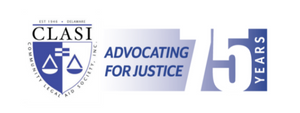FOR IMMEDIATE RELEASE: May 11, 2023
FOR FURTHER INFORMATION:
Sarah Rhine, Esq.
Managing Attorney, CLASI Housing Unit
302-674-8503 / srhine@declasi.org
CLASI Wins Important Fair Housing Victory in Delaware Supreme Court
Decision Will Impact Tenants with Disabilities Facing Eviction Statewide
WILMINGTON, DE—Community Legal Aid Society, Inc. (“CLASI”) has obtained a significant fair housing victory in the Delaware Supreme Court on behalf of an elderly tenant with disabilities, in a collaborative effort by CLASI’s Elder Law and Fair Housing Programs.
In Kravis v. Justice of the Peace Court 17 and MHC McNicol Place, LLC, the Delaware Supreme Court ruled that under state and federal fair housing laws, tenants with disabilities can request a reasonable accommodation from a landlord at any time prior to eviction. As a result, the Supreme Court determined that the Justice of the Peace Court made an error of law in evicting CLASI’s client without first considering his request for a reasonable accommodation of his disability.
“This is an important win for tenants with disabilities facing eviction across Delaware,” said Sarah Rhine, managing attorney of CLASI’s Housing Unit and the head of CLASI’s Fair Housing Program. “The Court’s decision recognizes vital protections contained in our fair housing laws, and will help to ensure that some of our most vulnerable residents can avoid eviction and stay in their homes.”
CLASI’s client is an elderly man who had suffered a traumatic brain injury and several strokes, and he spent two years in a hospital and nursing home. His grandson and the grandson’s girlfriend moved in with him to provide caregiving assistance. His landlord brought an eviction action against him in the Justice of the Peace Court because it did not approve of their living with him, as required by his lease.
CLASI argued that its client should not be evicted because he needed live-in assistance with his activities of daily living, due to his disabilities. Both the federal and state Fair Housing Acts prohibit discrimination based on disability, and they require landlords to make “reasonable accommodations” in rules and policies if necessary to allow tenants with disabilities an equal opportunity to use and enjoy their housing.
The client requested a reasonable accommodation from his landlord during the court proceedings, asking that his family members be allowed to live with him to provide caregiving assistance. The landlord rejected the request. The Justice of the Peace Court refused to consider his reasonable accommodation request as a defense to the eviction, saying that he should have made the request sooner. It awarded possession to the landlord.
On appeal, the Delaware Supreme Court agreed with CLASI’s argument that the Justice of the Peace Court should have considered its client’s reasonable accommodation request as a defense to eviction and evaluated whether the request was reasonable under the Fair Housing Acts. Although the client had not made the request until after the landlord started the eviction case, the Supreme Court ruled that that was sufficient, stating that “[i]n the context of an eviction action, the request can be made any time before the tenant is ‘actually evicted.’”
The Court then ordered that CLASI’s client receive a new trial before the Justice of the Peace Court to determine if his accommodation request was reasonable.
Congratulations to CLASI attorneys Olga Beskrone, Charles Clark, Richard Morse, Anthony Panicola, Jennifer Pérez, and John Whitelaw, whose combined efforts helped to achieve this important victory for Delaware tenants.
Read the Court’s full decision here: https://courts.delaware.gov/Opinions/Download.aspx?id=346420
Learn more about CLASI’s Elder Law Program here: https://www.declasi.org/elder-law-program/
Learn more about CLASI’s Fair Housing Program here: https://www.declasi.org/fair-housing/
The work that provided the basis for this publication was supported by funding under a grant with the U.S. Department of Housing and Urban Development. The substance and findings of the work are dedicated to the public. The author and publisher are solely responsible for the accuracy of the statements and interpretations contained in this publication. Such interpretations do not necessarily reflect the views of the Federal Government.
###
About Community Legal Aid Society, Inc.
Founded in 1946, the mission of Community Legal Aid Society, Inc. (“CLASI”) is to combat injustice through creative and persistent civil legal advocacy on behalf of vulnerable and underserved Delawareans. CLASI provides free legal representation to people with disabilities, people aged 60 or over, people with low incomes, and victims of crime and discrimination to help our clients obtain shelter, government benefits, educational services, medical services, orders of protection from abuse, legal immigration status, and other civil legal remedies. CLASI has offices in Wilmington, Dover, and Georgetown. Learn more at: https://www.declasi.org/
Photo Caption: CLASI client Robert Kravis at his Lewes home after the Delaware Supreme Court ordered that he receive a new eviction trial.

